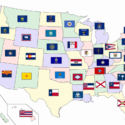States are admitted into the Union “on an equal footing with the original States in all respects whatever.” This phrase is part of the Northwest Ordinance. The idea is considered part of U.S. constitutional law, even though it is not in the U.S. Constitution.
The original states
The original states, in this case, are the 13 original states which were the first 13 states, which had been colonies of England before they became the United States: New Hampshire, Massachusetts, Rhode Island, Connecticut, New York, New Jersey, Pennsylvania, Delaware, Maryland, Virginia, North Carolina, South Carolina, and Georgia.
Every state admitted from 1789 on has been admitted on an equal footing with the original states.
Equal footing
Every new state has the same rights and responsibilities as the existing states. It is not possible for the United States to admit a state and restrict it in a way that would make it lesser than existing states.
For example, the United States could not admit Puerto Rico but keep the spending caps on Medicaid which Puerto Rico has as a territory. The United States could not admit Puerto Rico but demand that English be the only language used there.
Equally, Puerto Rico could not become a state but insist that it be able to make treaties with other countries outside of the United States, or that it would not follow all federal laws followed by other states.
As a state, Puerto Rico will have the same rights and responsibilities of all the other states.
States’ rights
States, unlike territories, have rights. States get to determine their taxes, issue drivers licenses, and make laws about anything that isn’t already specified in the U.S. Constitution.
The 19th Amendment to the Constitution says, “The powers not delegated to the United States by the Constitution, nor prohibited by it to the States, are reserved to the States respectively, or to the people.”
In other words, if something is not covered by the U.S. Constitution, states have the right to make their own decisions. Education is one example. The U.S. Constitution says nothing about eduction. Federal law requires states to provide free education to children, and to provide equal access to education for all the children living in a state, but beyond that, decisions about education in each state are up to the state.
Implications for Puerto Rico
One of the claims being made about statehood for Puerto Rico is that it has not been explained clearly enough. The people of Puerto Rico voted for statehood, this argument says, but only because they aren’t fully educated on the subject. Extensive education on the ramifications of statehood must be provided to voters before they can make up their minds.
This is of course an offensive argument, suggesting as it does that the voters of Puerto Rico are too ignorant to be able to choose a political status. But it is also lacking in merit. States are admitted on an equal footing with the other states. There are already 50 states. Puerto Rico’s rights and responsibilities as a state will be the same as those of all the other states. We can look at the history of the other states, and at their current situations, and see what statehood will be like for Puerto Rico.








No responses yet